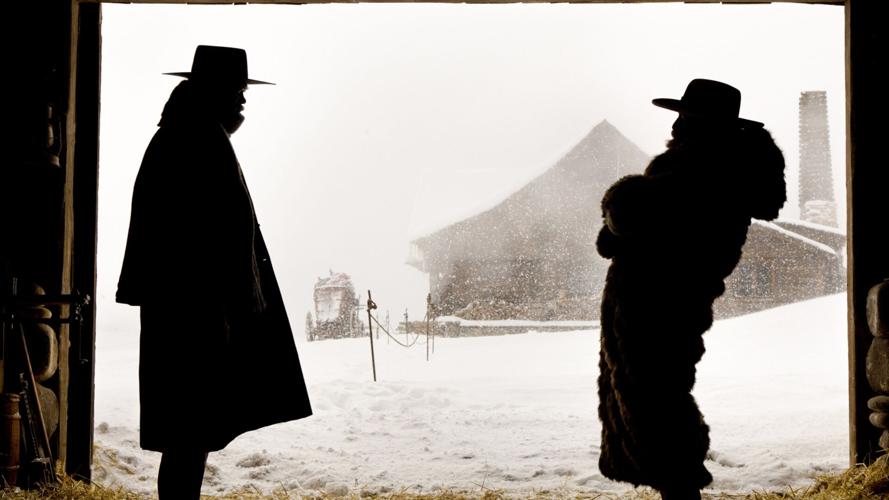

- COURTESY GAT PR
“As long as I’m creating — creating characters, creating stories, creating movies and film in general, I feel alive,” Iranian-Canadian filmmaker, Marjan Hashemi says.

- COURTESY GAT PR
“As long as I’m creating — creating characters, creating stories, creating movies and film in general, I feel alive,” Iranian-Canadian filmmaker, Marjan Hashemi says.

- The Weinstein Company
in “The Hateful Eight,” Quentin Tarantino blends serious dramatic moments and violent action with elements of black comedy, says Marjan Hashemi.
Marjan Hashemi says she needs to create — “characters, stories, movies” — in order to feel alive. “Sometimes it’s the only thing that gets me up in the morning,” said the Iranian-Canadian filmmaker, who won the 2023 Women in the Director’s Chair Feature Film Award for her feature debut “After Love.”
The film is a dark comedy about an Iranian-Canadian immigrant who, as Hashemi puts it, “learns from her defiant daughter and murderously amorous husband how to walk a line between tolerance and justice.”
“I was inspired by my mom’s courage and her bold sense of humour,” said Hashemi. “My admiration for her has found an outlet in this story, since I don’t often tell her how strong I think she is.”
The writer-director says she wants to share stories through her own cultural lens that transcend borders, speak to the human experience and challenge audiences.
“If people ask themselves a question about life, if they question their core beliefs, or if they have a little wonderment and doubt, then I think I’ve done a good job,” said Hashemi, whose core themes include freedom, women’s rights and social justice.
Here, Hashemi shares her five biggest cultural influences.
Martin McDonagh
“I’ve always been fond of McDonagh’s plays and his exceptional dark humour. His characters sometimes do awful things, but he masterfully manages to maintain some level of sympathy for them and give them space to purify themselves. In terms of applying dark humour, I was somewhat influenced by plays such as ‘The Beauty Queen of Leenane’ (1996) and films like ‘In Bruges’ (2008). He has a unique way of approaching relationships, friendships, death, life and the existential, while implementing comedy into all of them.”
Asghar Farhadi
“I’ve been influenced by Farhadi’s technique of revealing information in small doses throughout the film and the fact that he tells the stories of ordinary people so uniquely. His films are unpretentious and authentic. In ‘About Elly’ (2009) and ‘The Salesman’ (2016) he depicts human relations which are subject to conflicting forces in a society that is caught between modernization and tradition — that’s a major conflict in ‘After Love’ as well.”
Michael Haneke
“I watched Haneke’s film, ‘Amour’ (2012) after I finished writing the script for ‘The Drip’ (2018), my short film on which ‘After Love’ is based. I was told by a friend that my script reminded him of this film and he was amazed to find out I’d never watched it. ‘Amour’ focuses on an elderly couple, Georges and Anne, who are retired music teachers with a daughter who lives abroad. Anne has a stroke that paralyzes the right side of her body and Georges decides to kill her, out of love. I adore Haneke’s filmmaking style and I admire his unique take on these universal themes.”
Quentin Tarantino
“In ‘Django Unchained’ (2012) and ‘Hateful Eight’ (2015), Tarantino blends serious dramatic moments and violent action with elements of black comedy. His thought-provoking comedies usually challenge moral values and expose the absurdity of the situation in modern human lives. It’s a far-fetched influence on my work, but his films have definitely contributed to the shaping of my understanding of black comedy.”
Atom Egoyan
“I’ve always admired Egoyan as an immigrant artist. His characters are sometimes ordinary people who do out-of-the-ordinary things, which has influenced the characterization process in my works. In his film ‘Next of Kin’ (1984), he explores the themes of identity crisis, generation gap and belonging. A young man choosing a second family by pretending to be their son brings to mind the struggle of all immigrants who wish to belong and flourish in the new society.”
Abhiraj Lamba is a breaking news reporter, working out of the Star’s radio room in Toronto. Reach him via email: alamba@thestar.ca
*****
Credit belongs to : www.thestar.com
 MaharlikaNews | Canada Leading Online Filipino Newspaper Portal The No. 1 most engaged information website for Filipino – Canadian in Canada. MaharlikaNews.com received almost a quarter a million visitors in 2020.
MaharlikaNews | Canada Leading Online Filipino Newspaper Portal The No. 1 most engaged information website for Filipino – Canadian in Canada. MaharlikaNews.com received almost a quarter a million visitors in 2020.










